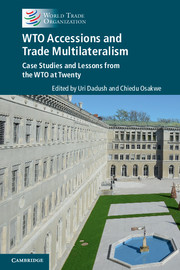Book contents
- Frontmatter
- Dedication
- Contents
- List of contributors
- Foreword
- Acknowledgements
- List of abbreviations
- Editors' note
- PART I WTO accessions, the trading system and the global economy
- PART II Overview: systemic outcomes from accessions
- PART III Members’ perspectives on accession negotiations
- Original members
- Article XII members
- 16 The 2001 WTO accession of China: negotiating experience – challenges, opportunities and post-accession approaches
- 17 The 2001 WTO accession of the Separate Customs Territory of Taiwan, Penghu, Kinmen and Matsu: negotiating experience – challenges, opportunities and approaches post-accession
- 18 The 2004 WTO accession of Cambodia: negotiating priorities and experience – growth and integration eleven years later
- 19 The 2008 WTO accession of Ukraine: negotiating experience – challenges, opportunities and post-accession approaches
- 20 The year 2012: WTO accession of Montenegro – why did we apply to join? Priorities and results
- 21 The 2012 WTO accession of Russia: negotiating experience – challenges, opportunities and post-accession approaches
- 22 The 2013 WTO accession of Lao PDR: specific commitments and the integration of least-developed countries into the global economy
- 23 The 2013 WTO accession of Tajikistan: experience of a landlocked economy in a changing regional economic configuration
- 24 The 2014 WTO accession of Yemen: accession negotiations as an instrument for domestic reform, national security and international cooperation
- PART IV Working party chairpersons’ perspectives on accession negotiations
- PART V Salient features inWTOAccession Protocols
- PART VI Conclusion
- Annex: Contributor biographies
- Index
- Plate section
24 - The 2014 WTO accession of Yemen: accession negotiations as an instrument for domestic reform, national security and international cooperation
from Article XII members
Published online by Cambridge University Press: 05 November 2015
- Frontmatter
- Dedication
- Contents
- List of contributors
- Foreword
- Acknowledgements
- List of abbreviations
- Editors' note
- PART I WTO accessions, the trading system and the global economy
- PART II Overview: systemic outcomes from accessions
- PART III Members’ perspectives on accession negotiations
- Original members
- Article XII members
- 16 The 2001 WTO accession of China: negotiating experience – challenges, opportunities and post-accession approaches
- 17 The 2001 WTO accession of the Separate Customs Territory of Taiwan, Penghu, Kinmen and Matsu: negotiating experience – challenges, opportunities and approaches post-accession
- 18 The 2004 WTO accession of Cambodia: negotiating priorities and experience – growth and integration eleven years later
- 19 The 2008 WTO accession of Ukraine: negotiating experience – challenges, opportunities and post-accession approaches
- 20 The year 2012: WTO accession of Montenegro – why did we apply to join? Priorities and results
- 21 The 2012 WTO accession of Russia: negotiating experience – challenges, opportunities and post-accession approaches
- 22 The 2013 WTO accession of Lao PDR: specific commitments and the integration of least-developed countries into the global economy
- 23 The 2013 WTO accession of Tajikistan: experience of a landlocked economy in a changing regional economic configuration
- 24 The 2014 WTO accession of Yemen: accession negotiations as an instrument for domestic reform, national security and international cooperation
- PART IV Working party chairpersons’ perspectives on accession negotiations
- PART V Salient features inWTOAccession Protocols
- PART VI Conclusion
- Annex: Contributor biographies
- Index
- Plate section
Summary
ABSTRACT
In 2011, a popular revolution occurred in Yemen, leading to the formation of the government which brought the accession process to its conclusion in 2014, following years of long and complex negotiations. From the beginning, Yemen's accession process was envisaged not as an end in itself, but as a means to achieve other, more imperative, objectives, including poverty reduction, decreasing levels of chronic unemployment and raising levels of sustained development to meet the needs of a rapidly growing population. This chapter gives an account of the accession process, focusing on the positive effects of Yemen's accession to the WTO, both as a catalyst for long sought-after domestic reform and as a useful and convenient path to reach higher levels of reform for which the accession process acted as a spur. The aspiration was to create a competitive business environment that would lead to efficient resource allocation and ultimately boost output and productivity as well as increasing the well-being of the populace and reaping the benefits of WTO membership. Joining the WTO does not mark the end of the reform process. There is work post-accession to establish and strengthen different institutions to exercise the benefits of WTO membership for Yemen.
When I was invited to contribute to this important book project, Yemen had just completed an accession negotiation journey that had lasted more than thirteen years, to reach the eleventh and final working party meeting on 26 September 2013. Later in the year, on 4 December 2013 at the Ninth WTO Ministerial Conference in Bali, Indonesia, the WTO adopted Yemen's Protocol of Accession and related documents. Subsequently, Yemen completed its domestic ratification process and, as Minister for Trade and Industry, I deposited Yemen's Instrument of Acceptance of the protocol on the accession of Yemen with WTO Director-General Roberto Azevêdo on 27 May 2014. On 26 June 2014, Yemen became the 160th member of the WTO. Thus, I thought it quite apposite to participate in this noble endeavour and share some thoughts from the perspective of the Yemen accession experience.
- Type
- Chapter
- Information
- WTO Accessions and Trade MultilateralismCase Studies and Lessons from the WTO at Twenty, pp. 568 - 578Publisher: Cambridge University PressPrint publication year: 2015



